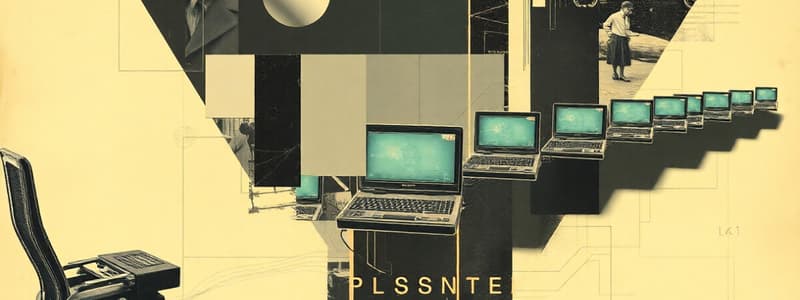Podcast
Questions and Answers
What is the main function of a Universal Turing Machine (UTM)?
What is the main function of a Universal Turing Machine (UTM)?
- To operate with a fixed set of rules and instructions
- To only compute specific operations efficiently
- To simulate a physical object in a computational way
- To perform any computation based on the given inputs (correct)
What does Connectionism reject in the context of mental processes?
What does Connectionism reject in the context of mental processes?
- The concept of fixed learning algorithms
- The idea that mental representations are symbolic (correct)
- The need for instruction-driven computation
- The dualism between mind and matter
According to the computational theory of mind, how can thinking arise?
According to the computational theory of mind, how can thinking arise?
- Only through complex algorithms programmed into a system
- From information processing in physical objects (correct)
- By applying a series of random rules without structure
- Exclusively from non-physical phenomena
Which of the following is a limitation of the Universal Turing Machine?
Which of the following is a limitation of the Universal Turing Machine?
How does the mind relate to the definition of a general-purpose programmable computer?
How does the mind relate to the definition of a general-purpose programmable computer?
What does the Classical Computational Theory of Mind (CCTM) suggest about the mind?
What does the Classical Computational Theory of Mind (CCTM) suggest about the mind?
Which of the following is a feature allowed by CCTM that differs from traditional Turing machines?
Which of the following is a feature allowed by CCTM that differs from traditional Turing machines?
In ACT-R cognitive theory, what is indicated by the statement 'If: 3+3→6'?
In ACT-R cognitive theory, what is indicated by the statement 'If: 3+3→6'?
What are the two types of memory defined in ACT-R cognitive theory?
What are the two types of memory defined in ACT-R cognitive theory?
How do algorithms in the computational theory of mind operate?
How do algorithms in the computational theory of mind operate?
What does the notion of 'probabilistic transitions' imply in the context of CCTM?
What does the notion of 'probabilistic transitions' imply in the context of CCTM?
What aspect of traditional Turing machines is not adhered to in the CCTM framework?
What aspect of traditional Turing machines is not adhered to in the CCTM framework?
Which of the following statements best expresses the capability of neurons concerning logical operations?
Which of the following statements best expresses the capability of neurons concerning logical operations?
What is a characteristic of a Turing machine?
What is a characteristic of a Turing machine?
What does the Church-Turing Thesis illustrate about computations?
What does the Church-Turing Thesis illustrate about computations?
Which of the following best describes the role of algorithms in computation?
Which of the following best describes the role of algorithms in computation?
How does Ada Lovelace’s view on the Analytical Engine contribute to computational theory?
How does Ada Lovelace’s view on the Analytical Engine contribute to computational theory?
What is a limitation of the Antikythera mechanism compared to modern computers?
What is a limitation of the Antikythera mechanism compared to modern computers?
Which feature is highly significant in Alan Turing’s concept of computation?
Which feature is highly significant in Alan Turing’s concept of computation?
What does the phrase 'general-purpose calculator' refer to in the context of computation?
What does the phrase 'general-purpose calculator' refer to in the context of computation?
What does the phrase ' computations of the mind' imply in computational theory?
What does the phrase ' computations of the mind' imply in computational theory?
Flashcards are hidden until you start studying
Study Notes
Turing Machine: Building Blocks of Computation
- Turing machines are theoretical systems with an infinite tape of memory, a current position, and a lookup table.
- The lookup table dictates the next action based on the machine's state and the symbol at the current position.
- The Church-Turing thesis states that any computation a human can perform with pencil and paper can be done by a Turing machine.
- A Turing machine can be programmed to solve specific computational problems.
- A Universal Turing Machine (UTM) takes a description of a Turing machine as input and executes it, making it a general-purpose computer.
- Though powerful, the UTM can be inefficient for certain operations.
Mind as a Turing Machine: Classical Computational Theory of Mind (CCTM)
- The mind is a computational system using algorithms and representations similar to a Turing machine.
- Memory representations are discrete symbols.
- Algorithms are sequential steps.
- CCTM challenges dualism, suggesting mind can arise from physical implementations.
Beyond Traditional Turing Machines
- CCTM allows for non-traditional elements:
- Memory access beyond left/right movements.
- Parallel computation.
- Probabilistic transitions.
Example: ACT-R Cognitive Theory
- This theory combines declarative memory (facts and knowledge) and procedural memory (rules and procedures) to model cognitive processes.
- Declarative memory includes facts like "3+3=6."
- Procedural memory uses rules like:
- If a goal is to add a column with values X and Y, and a fact matching X+Y=Z exists, then write the ones place of Z and activate carry goal if Z > 9.
Von Neumann Architecture
- This is a computer architecture widely used today, not explicitly mentioned in the text but relevant to the discussion.
- It is a general-purpose programmable computer that can be instructed to execute various computations.
Mental Processes and Programmability
- While the mind is a general-purpose computer in some sense, many mental processes might not be fully programmable.
- Instead, they might employ fixed learning algorithms for acquiring skills and information.
Connectionism: An Alternative to CCTM
- Connectionism challenges the symbolic nature of mental representations and linear algorithms.
- It proposes that mental processes arise from interconnected networks of nodes, rather than symbolic manipulation.
Studying That Suits You
Use AI to generate personalized quizzes and flashcards to suit your learning preferences.




